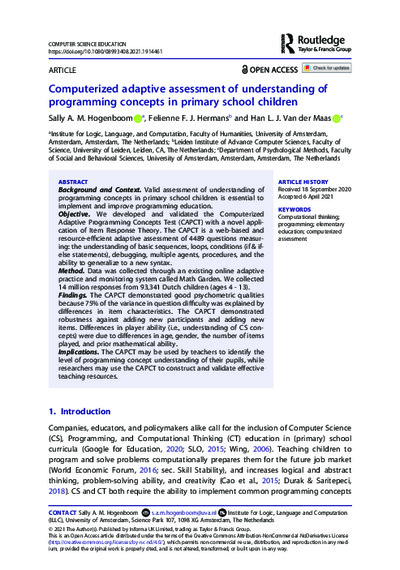Computerized adaptive assessment of understanding of programming concepts in primary school children Publikationsdatum:
|
 |
 Diese Seite wurde seit 3 Jahren inhaltlich nicht mehr aktualisiert.
Unter Umständen ist sie nicht mehr aktuell.
Diese Seite wurde seit 3 Jahren inhaltlich nicht mehr aktualisiert.
Unter Umständen ist sie nicht mehr aktuell.
 Zusammenfassungen
Zusammenfassungen
 Background and Context. Valid assessment of understanding of programming concepts in primary school children is essential to implement and improve programming education. Objective. We developed and validated the Computerized Adaptive Programming Concepts Test (CAPCT) with a novel application of Item Response Theory. The CAPCT is a web-based and resource-efficient adaptive assessment of 4489 questions measuring: the understanding of basic sequences, loops, conditions (if & if-else statements), debugging, multiple agents, procedures, and the ability to generalize to a new syntax. Method. Data was collected through an existing online adaptive practice and monitoring system called Math Garden. We collected 14 million responses from 93,341 Dutch children (ages 4 - 13). Findings. The CAPCT demonstrated good psychometric qualities because 75% of the variance in question difficulty was explained by differences in item characteristics. The CAPCT demonstrated robustness against adding new participants and adding new items. Differences in player ability (i.e., understanding of CS concepts) were due to differences in age, gender, the number of items played, and prior mathematical ability. Implications. The CAPCT may be used by teachers to identify the level of programming concept understanding of their pupils, while researchers may use the CAPCT to construct and validate effective teaching resources.
Background and Context. Valid assessment of understanding of programming concepts in primary school children is essential to implement and improve programming education. Objective. We developed and validated the Computerized Adaptive Programming Concepts Test (CAPCT) with a novel application of Item Response Theory. The CAPCT is a web-based and resource-efficient adaptive assessment of 4489 questions measuring: the understanding of basic sequences, loops, conditions (if & if-else statements), debugging, multiple agents, procedures, and the ability to generalize to a new syntax. Method. Data was collected through an existing online adaptive practice and monitoring system called Math Garden. We collected 14 million responses from 93,341 Dutch children (ages 4 - 13). Findings. The CAPCT demonstrated good psychometric qualities because 75% of the variance in question difficulty was explained by differences in item characteristics. The CAPCT demonstrated robustness against adding new participants and adding new items. Differences in player ability (i.e., understanding of CS concepts) were due to differences in age, gender, the number of items played, and prior mathematical ability. Implications. The CAPCT may be used by teachers to identify the level of programming concept understanding of their pupils, while researchers may use the CAPCT to construct and validate effective teaching resources. Dieser wissenschaftliche Zeitschriftenartikel erwähnt ...
Dieser wissenschaftliche Zeitschriftenartikel erwähnt ...
 Personen KB IB clear | Osman Aksit , Kristy Elizabeth Boyer , Karen Brennan , Andrej Brodnik , Hatice Yildiz Durak , Evelyn Eastmond , Yasmin B. Kafai , Maria Kallia , James C. Lester , Jennifer E. London , John Maloney , Amon Millner , Andrés Monroy-Hernández , Jesús Moreno-León , Bradford W. Mott , Mitchel Resnick , Gregorio Robles , Eric Rosenbaum , Natalie Rusk , Mustafa Saritepeci , Cynthia C. Selby , Sue Sentance , Jay Silver , Brian Silverman , Françoise Tort , Eric N. Wiebe , Jeannette M. Wing , World Economic Forum (WEF) | |||||||||||||||||||||||||||||||||||||||||||||||||||||||||||||||
 Begriffe KB IB clear |  Computer Computer computer
, computer
,  Kinder Kinder children
, children
,  Programmieren Programmieren programming
, Programmierkonzepteprogramming concepts programming
, Programmierkonzepteprogramming concepts
| |||||||||||||||||||||||||||||||||||||||||||||||||||||||||||||||
 Bücher |
| |||||||||||||||||||||||||||||||||||||||||||||||||||||||||||||||
 Texte |
|
 Dieser wissenschaftliche Zeitschriftenartikel erwähnt vermutlich nicht ...
Dieser wissenschaftliche Zeitschriftenartikel erwähnt vermutlich nicht ... 
 Nicht erwähnte Begriffe | Eltern, Fehlvorstellungen beim Programmieren, Schule |
 Tagcloud
Tagcloud
 Zitationsgraph
Zitationsgraph
 Zitationsgraph (Beta-Test mit vis.js)
Zitationsgraph (Beta-Test mit vis.js)
 Zeitleiste
Zeitleiste
 Anderswo finden
Anderswo finden
 Volltext dieses Dokuments
Volltext dieses Dokuments
 |  Computerized adaptive assessment of understanding of programming concepts in primary school children: Artikel als Volltext ( Computerized adaptive assessment of understanding of programming concepts in primary school children: Artikel als Volltext ( : :  , 6367 kByte; , 6367 kByte;  : :  ) ) |
 Anderswo suchen
Anderswo suchen 
 Beat und dieser wissenschaftliche Zeitschriftenartikel
Beat und dieser wissenschaftliche Zeitschriftenartikel
Beat hat Dieser wissenschaftliche Zeitschriftenartikel während seiner Zeit am Institut für Medien und Schule (IMS) ins Biblionetz aufgenommen. Er hat Dieser wissenschaftliche Zeitschriftenartikel einmalig erfasst und bisher nicht mehr bearbeitet. Beat besitzt kein physisches, aber ein digitales Exemplar. Eine digitale Version ist auf dem Internet verfügbar (s.o.). Es gibt bisher nur wenige Objekte im Biblionetz, die dieses Werk zitieren.


















 Biblionetz-History
Biblionetz-History